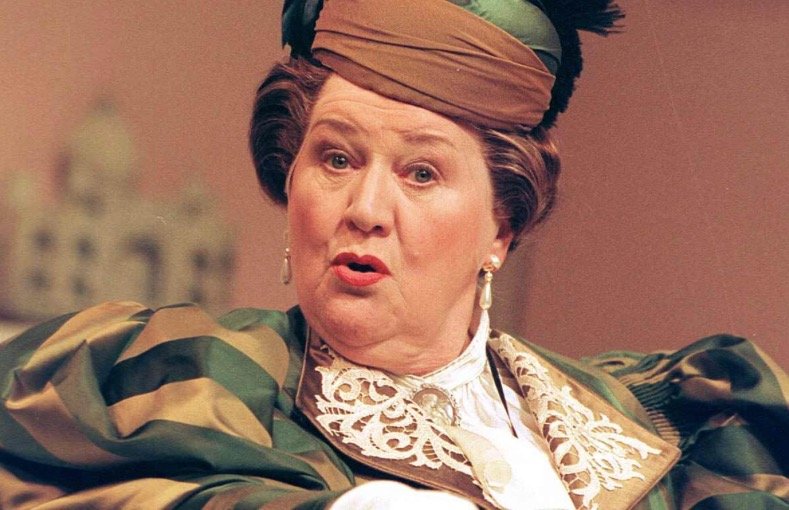In Tribute to Patricia Routledge, as Lady Bracknell
“All women become like their mothers. That is their tragedy. No man does. That’s his.”
Algernon

There is a very good exhibition on at the British Library in Euston of many of Oscar Wilde’s manuscripts and ephemera. The most remarkable of which I found, was the original calling card which the Marquis of Queensberry left at Wilde’s club and the most poignant, the De Profundis letter and the notice of the auction of all of Wilde’s property at the house in Tite Street, Chelsea due to his bankruptcy.
I was reminded that Queensberry attempted to shame Wilde at the opening performance of The Importance of Being Earnest but failed to gain admittance to the theatre and instead left a bouquet of rotting vegetables at the stage door. Four days later, Queensberry’s next move was to leave his visiting card with its scribbled defamatory message at The Albermarle. This was the catalyst for the trials.
So now you understand why The Importance of Being Earnest was to be Wilde’s last play. If Queensberry had seen the play he might well have recognised some aspects of his own wife in the character of Lady Bracknell, who Wilde based partly on Bosie’s mother and partly on his elderly English aunt.
As I looked at the evidence of Wilde’s scholarship (he won the Newdigate poetry prize at Oxford and was by all accounts a brilliant classicist) I wondered what the effect would have been if, instead of writing comedy he had used his talent for more heavyweight drama. This is not to denigrate Wilde’s creation of masterpieces of social comedy, stuffed full of those epigrams of delicate wit and irony which have now become part of our language.
In the event that you’ve never seen or read Earnest, it is about the courtship of two society bachelors in the 1890s, Jack Worthing (Alistair Petrie) and Algy Moncrieff (Theo Fraser Steele). In order to play away from home these men have invented fictitious characters to explain their absence – from the country in Jack’s case, and town in Algy’s. Jack meets Gwendolen Fairfax (Essie Davis), daughter of the dragon, Lady Bracknell (Patricia Routledge), introducing himself as Ernest. Algy goes to the country, pretends to be Jack’s disreputable but fictitious brother, Ernest, where he meets and woos Jack’s ward, Cecily Cardew (Sarah Kants).
Jack was a foundling, left as a baby in a handbag at Victoria Station and is unable to satisfy Lady Bracknell’s enquiries as to the suitability of his parentage. Both girls capriciously insist that they will only consider being engaged to someone called Ernest and both men rapidly arrange to be christened Ernest. The meeting of Miss Prism (Beverley Dunn), a governess and Lady Bracknell reveals Jack’s true parentage.
Christopher Morahan’s production of Wilde’s classic originated at Chichester in 1999, has been to Australia and returns to London with some cast changes of Antipodean actors. In the interim, it seems to have gained in strength. It is pacy entertainment and makes the one hundred and fifty minutes almost fly by. What is particular about this production is the strength of Gwendolen (Essie Davis). We have no doubt that Lady Bracknell’s daughter will turn out as strong willed and opinionated as her mother.
Patricia Routledge is a formidable Lady Bracknell, quite terrifying. Routledge, well known for her performance in the sit com Keeping Up Appearances, of course, has all the pretentiousness and snobbery of the Victorian matrons that Wilde saw around him. Theo Fraser Steele’s Algy is a idle young rascal, full of fun, he walks across the furniture with careless abandon but his performance has heaps of enthusiasm. Alistair Petrie’s Jack is more staid and slightly stuffy and we are sure that within weeks Gwendolen will be getting her own way in everything. Essie Davis’ confident Gwendolen is spirited and determined.
The three sets are of the period, Algernon’s study with art nouveau marquetry, bookcases and masculine furniture, the country garden with overhanging Scots Pine and white framed conservatory, the Manor house morning room with nineteenth century furniture and symmetrical pairs of ornaments. I liked the costumes, particularly Gwendolen’s and Lady Bracknell’s , crowned by delightful millinery complete with quivering feathers.
Wilde’s comedy of manners is too accomplished to be categorised as farce but is more aptly tagged as a comedy of manners. His characters are cleverly constructed and he pokes fun at the hypocrisy of society. As Algy says, “The truth is never pure and rarely simple.”
EDITOR’S NOTE in 2025
This is the only time I saw Patricia Routledge onstage. This production was shown to Queen Elizabeth the Queen Mother on her 99th Birthday. Dame Patricia Routledge died on 3rd October 2025 aged 96.
Production Notes
The Importance of Being Earnest
Written by Oscar Wilde
Directed by Christopher Morahan
Cast
Starring:
Patricia Routledge
With:
Paul Stewart
Theo Fraser Steele
Alistair Petrie
Essie Davis
Beverley Dunn
Sarah Kants
Jonathan Elsom
David Brierley
Creatives
Director: Christopher Morahan
Design: Peter Rice
Lighting Design: Robert Bryan
Sound Design: John Leonard
A Chichester Festival Theatre Production
Information
Running Time: Two hours 30 minutes with an interval
Closed 24th March 2001
Theatre:
Savoy Theatre
Savoy Court
The Strand
London WC2R 0ET
Reviewed by Lizzie Loveridge at the
at the Savoy Theatre
on 25th January performance 2001

